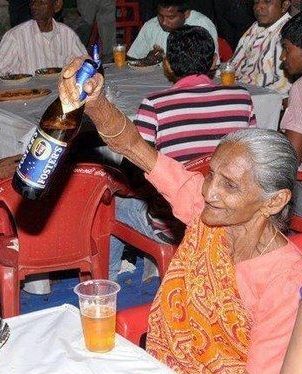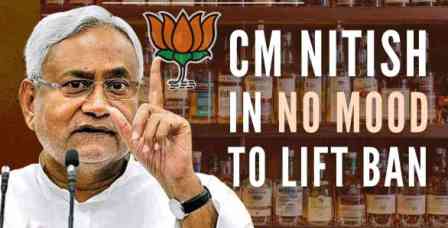As the Supreme Court is coming down heavily on Chief Minister Nitish Kumar’s irksome penchant for shoving tipplers in jail to enforce prohibition in Bihar, a new directive from the Nitish led administration says that those caught drinking liquor will be let off if they provide information about the bootleggers.
Faced with a deluge of bail petitions arising out of the Bihar government’s 2016 fractious liquor prohibition law, the Supreme Court last week asked the state government whether it conducted any study before framing it. It asked if adequate judicial infrastructure was created to meet the torrent of litigation that was bound to follow.
The court highlighted the extent of the problem by illustrating that 16 of 26 judges in the Patna high court are occupied with cases related to the 2016 liquor prohibition law, thus clogging up the judicial system.
“We find a number of cases coming to this Court arising from proceedings initiated under the Bihar Prohibition and Excise Amendment Act. The trial Court and the High Court are both being crowded by bail applications to an extent that at some stage 16 judges of the High Court are listening to bail matters, and prosecutions under the Act concerned form a large part of it. Denial of bail would also result in crowding of the prisons,” noted the bench in its February 23 order.
Observers in Bihar will bear witness to how Chief Minister Nitish Kumar imposed prohibition overnight, and stringent legislation driving hundreds of men into jail for the possession or consumption of even a small bottle of liquor.
As per Bihar police records, 3,48,170 cases were lodged and 4,01,855 arrests made under the Bihar Prohibition and Excise law until October 2021 and about 20,000 bail pleas in such cases are pending disposal either in the high court or in trial courts.
Last month, a bench led by Chief Justice of India NV Ramana dismissed the Bihar government’s batch of appeals against the grant of anticipatory and regular bails to accused under the state’s stringent liquor law, saying these matters have choked the courts.
The SC bench also took note of the rigorous provisions of the legislation and asked whether the state government would be willing to introduce the provisions of plea-bargaining in the law so that accused can plead guilty to the charges in exchange for certain concessions by the prosecution in the punishment.
“We would also like to know whether the plea-bargaining provisions can be taken recourse to deal with the scenario as it is emerging,” recorded the court, while seeking the state’s response by March 8.
Against this background comes the new directive : people who consume alcohol will not be arrested. Instead, offenders would be forced to reveal information about the liquor racket. If the authorities are able to make arrests based on the information provided, the perpetrators will not be sentenced to prison.
There it is. The ‘plea bargain’ decision was taken in a meeting on Monday, February 28.
Now here’s the government spin:
Deputy Commissioner, Excise, Krishna Kumar, told reporters that “relaxation” was being introduced with a view to tighten the noose on the network of smugglers and liquor peddlers.
“Now, if a person is caught drunk he will be asked about the place and persons who made alcohol available to him. A raid would be conducted on the basis of the tip-off and if the information is found correct, the informant will not be jailed”, he said.
The Bihar Government outlawed the sale and consumption of alcohol in April 2016, a year after the Chief Minister decided to honour an election promise to women voters that he would eliminate ‘intoxication’

The state’s implementation of the prohibition law, which incorporates a number of harsh provisions, has been inconsistent.
Attempts by the police to implement the law have been met with a great deal of animosity, including arrests of visitors from outside the state and raids on wedding parties.
The constitutional validity of Bihar’s controversial liquor prohibition law is also under challenge before the Supreme Court
.A bench, headed by justice AM Khanwilkar, is hearing of a bunch of petitions, including one by the International Spirits and Wines Association of India. The petitions have raised issues of violation of an individual’s right to make choices, right to privacy, arbitrary and unreasonable restriction and draconian punishment under the law.
On February 14, this bench transferred similar petitions pending before the Patna High Court to itself and asked the state government to file its comprehensive response to the challenge to the 2016 law.
The court will hear this matter next in the first week of April.
The Chief Minister has been trying to make prohibition effective through anti-liquor sermons at public meetings.Equipping police prohibition units with high-end resources like helicopters, drones, satellite phones, motorboats, and sniffer dogs is part of the optics.
Meanwhile, intoxication is on the rise, according to several media reports that show an increasing use of a range of narcotics and a high increase of substance abuse among kids and young people in Bihar.
Content writer: Nishant Mishra


